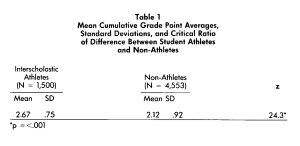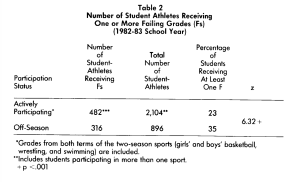Last night I was watching the Penn State vs Ohio State football game (which I ended up turning off after a terrible first half). As I was watching, I thought about all the time that practices, travelling, press, game days, etc. take up in a player’s life. How do they have time to do their schoolwork and do it well? The reason I didn’t play sports in high school was because I was afraid it would interfere with my schoolwork in a negative way. I still believe that it does. I believe that student athletes’ grades must be significantly lower than those of students who do not play sports.
In 1986, a study was done to examine the relationship between sports and academic achievement. The grades of 24,000 students were examined. Out of these students, the records of 1,500 student athletes and 4,553 records of students not on sports teams were reviewed. The research shows evidence against my claim. The average GPA of student athletes was 2.67, while the average GPA of non-participating students was a 2.12.
The study then looked at the receiving failing grades for student athletes. During the season, 23 percent of the possible F’s able to be given were given then. During the off-season, 35 percent of the possible F’s were given then. More student athletes were failing during the off-season than when they were participating in their sport.
Although the data from this study seems strong, I do not believe it is enough. In order to make the evidence stronger, I think a survey should have been given to all the students asking them to describe the courses they are taking and how many they are taking. Student athletes, because of their rigorous schedules, may be taking less classes, and/or “easier” courses. Additionally, the survey should include whether or not their sport has a minimum GPA requirement. Are student-athletes only obtaining higher GPA’s in order to avoid getting kicked off the team, or do they really care about their grades? This question could stem further into the rate of cheating among athletes. If they need a minimum GPA to stay on their sports team, how far would they go to maintain that score between their own busy schedules? Evaluating these variables would make the study much more interesting and convincing.



I found this blog interesting but would have to disagree with your hypothesis. My hypothesis is that being a student athlete in high school actually helps improve grades. Student athletes, especially those in high school, are required to maintain a minimum GPA in order to participate in sports. I played field hockey in high school and we were constantly required to submit our grades to our coaches. If anyone had a grade lower than a C, that athlete was no longer allowed to participate in the sport. This alone kept everyone on the team in line and on top of their work. On a more scientific level, the exercise of sports releases endorphins which helps increase happier moods but also helps clear one’s help and increases concentration levels. As a result, students who work out right before they do their homework actually retain more information and do better on the assignments. Student athletes already are crunched on time and as a result, in most cases, come home from practice at night and begin homework immediately, thus giving them a greater advantage over those students who are not physical active before studying. Many studies show that students who are involved in sports preform better than those students who are not active.
There is lots of evidence to support that an increase in responsibilities actually improves grades among students, with athletics being one of those ways in which a person can increase workload. Other ways include playing an instrument, participating in various clubs and activities, and participating in community service. From personal experience as a high school baseball player, my grades were very good all year round because I played baseball all year. Being hit with lots of schoolwork and baseball practices and games forced me to stay on top of my schedule and reduced the amount of free time I had. I found this to be beneficial because I did not have time to slack off or get distracted with useless things. In addition, you included in your post about easier classes for student-athletes to compensate for the amount of time they spend on the field, talking to press, etc. I personally never took easier classes to lighten my workload, if anything I pushed myself to take as hard of classes as possible because I knew I would perform better in school with a harder schedule to reduce free time. I took all honors and AP classes in my four years of high school and graduated with a 3.7 unweighted GPA. While I know some student-athletes are given the opportunity to take easier classes and often get away with cheating, I do not think that is a significant third confounding variable based on my own experiences as a student-athlete. I encourage you to try out a club sport while you have time here at Penn State if you are interested. I think it will be a surprising and a very positive experience for you, one that could show significant academic improvement the way I had in high school.
I found this post to be extremely interesting for in high school I was a student-athlete. In college, with the obvious increase of work load I could never imagining having to balance a sport along with academics. I think that this study was one that finds certain sufficient evidence but maybe does not take other confounding factors into consideration. Different aspects like parental involvement and environment of the school can create a very large difference in athletics and school. Overall, I found this post to be very interesting and one that I have certainly thought of in the past.